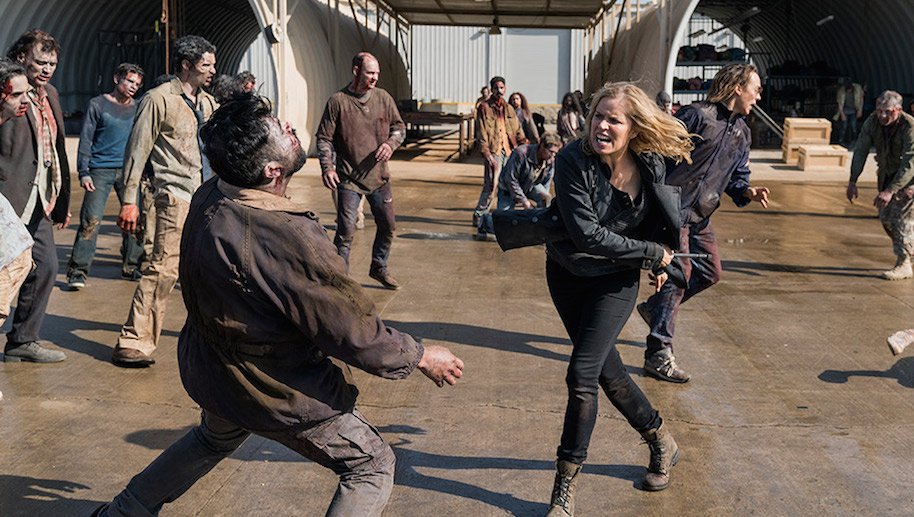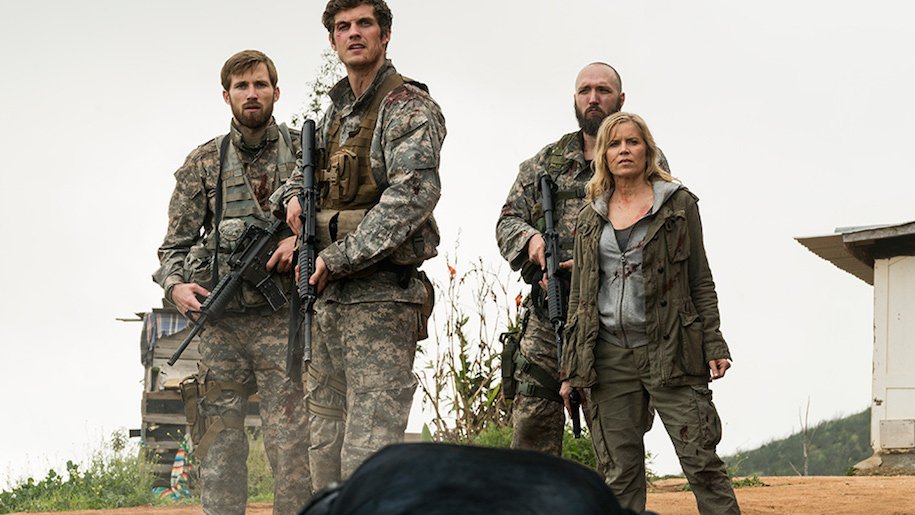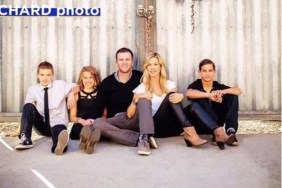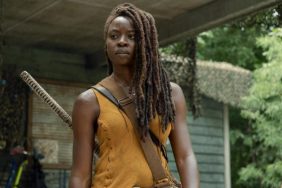Since it’s debut in 2015 Fear The Walking Dead – AMC’s companion series to The Walking Dead – has offered a more nuanced approach to life in a post apocalyptic wasteland where people rise from the dead to walk the earth as mindless dimwitted killing machines.
It follows the story of Madison Clark (Kim Dickens) and her partner Travis Manawa (Cliff Curtis) and their children from previous relationships, with the first series seeing the family first discovering the outbreak and then trying to survive and escape Los Angeles, while the second and third season follow their escape and arrival in Mexico. Trading frenetic action for purposeful pacing, and jump in your seat scares with building tension, the series roots the story in the characters from the very beginning, their inner lives being key to understanding how they deal with the outer turmoil.
At the heart of all of this however is the family, only in this show what that means isn’t always clear. With Madison and Travis’s own family made up of two broken ones, and with the other families in the show struggling with their own issues and traumas, Fear The Walking Dead takes the trope of the family unit turns it inside out and on its head all while in the process painting a frank portrait of what family means in modern world.
A Very Brady Apocalypse
It may sound ridiculous but it has to be said – the series opens as a twisted version The Brady Bunch. It’s a story of two single parents trying to raise a family together, with Madison’s children; heroin addict Nick (Frank Dillane) and over achieving Alicia (Alycia Debnam-Carey), and Travis’s resentful son Chris (Lorenzo James Henrie) rounding out the family unit along with Liza Ortiz (Elizabeth Rodriguez), Travis’s ex wife and Chris’s mother in the mix for good measure.
The similarities stop there however, the show tackling the premise from an entirely different not-70s-camp-sitcom perspective. The bright pastel values of the Brady family have been replaced with a whole lot of moral grey area.
Madison and Travis’s not so nuclear family struggle with impossible moral decisions and their own strained relationships with each other throughout the series. What few moments of happy family time sneak in are over quickly, with the overall image of family life being one of calamity and conflict – which is what is so groundbreaking.
While family feud’s have long been a gold mine for comedy writers and dramatists alike, Fear The Walking Dead uses hardship as reason for the family to band together rather than a wedge to drive them apart soap opera style. The show knows that family are the people you stick by through thick and thin, and not always the people who agree with you or tell you what you want to hear, and you don’t often know who is who until the pressure is on.
Walkers In The Closet
This idea of family being defined by solidarity in hardship is best epitomized in the series by the contrast between the relationships between Madison and Nick, and Travis and Chris. Eschewing the traditional drug addict son and outraged/concerned mother relationship, Madison recognizes Nick’s addiction as an illness even going so far as to get him Oxycodone when he goes through withdrawal rather than locking him up in his room with a double jointed ghost baby Trainspotting style.
This pattern of hardship strengthening the family unit goes deeper still, with Nick’s struggle with addiction and Madison and Travis trying to help him through it leading to the characters discovering the truth of the walker outbreak in the first place. In what will become a bit of a running theme through the show, it is the characters’ trauma and their willingness to address it as a family that bonds them together and allows them to discover and then overcome the obstacles to their survival.
Travis and Chris on the other hand are unable to address their trauma. Resenting his father for divorcing his mother and starting a new family with Madison, Chris and Travis are already off to bad start as a series kicks off. Travis tries his best to heal their divide, even following Chris when he decides to leave the rest of the family.
But Chris refuses to let go of his anger and resentment. Wandering the Mexican waste with his father, it boils inside him and drives him to want to join up with roving band of violent and cruel American tourists caught out by the epidemic while on spring break. Turning his back on his father’s love and aid, despite Travis’ many attempts to get through to him, Chris decides to choose a new family, with disastrous consequences.

You Can’t Choose Family – Or Can You
The question of whether or not you can choose your family underlies a lot of the action of Fear The Walking Dead. Taking the concept of the family well beyond the genealogical sense of the word, each group or settlement Madison and co encounter in the show is either literally (Jaw Bone Ranch) or figuratively (The Proctors) constructed as a family.
Yet as the show goes on, every group, every family of choice if you will allow me the poetic license, comes undone, even Madison and Travis’ own. Yet the bonds of responsibility between Madison, Nick and Alicia hold strong, even when the bonds of love break.
It has to be said here, that for all my writing on family in the show, the family itself is broken up for most of the second and third season. However despite this they each always help each other when in need, and often at risk to their own personal safety or that of others, and it is this that is at the heart of the show’s idea of family – that its not easy.
The Single Mother As Hero
Placing Madison at the center of the story goes a long way to drive home the shows deconstruction of traditional family values. Rather than the father – or step-father in this case – leading the family, Madison does, doing so in an increasingly ruthless fashion as the stakes get ever higher and her family are always in danger.
Unlike your standard male protagonist who never seems to be able to do what is necessary until circumstances make a difficult moral choice inevitable, Madison is less reluctant to make hard choices. She is driven by her love and loyalty for her family, even if that means turning on a family member gone malignant. As when it’s clear Chris is beginning down a path of anger and violence, she doesn’t shy away from being honest with Travis, despite knowing that doing so will drive him away.
Importantly though Madison has her own inner life, desires and fears and her love of her family in no ways defines her as a person to us. Yet from her perspective, her identity as a mother is what defines her purpose for surviving, and it is how she chooses to continue to define herself when she could just give up.
The fact that she doesn’t, that she continues to choose this identity despite the burden that comes with it, is perhaps the shows most telling comment on the modern family; that the only thing that keeps it together is a a woman’s sacrifice of her identity as individual to become a mother.

–
Fear the Walking Dead: Season 3 is out now on Blu-ray, DVD & Digital.







